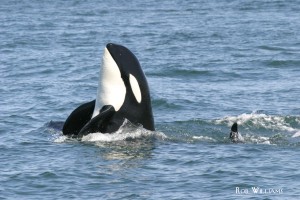
Today is World Orca Day. To be honest, we learned that today on Twitter. It’s not a big holiday around here, because doing science to inform killer whale conservation is what we do every day. Every day is Orca Day around here.
But in honour of the event, we’ve put together a quick summary of some key ways our team is working to protect wild killer whales and their habitat.
- Ocean noise. The critical habitats of northern and southern resident killer whales happen to include some pretty busy shipping lanes, and our research has shown that those are some of the noisiest waters on the BC coast. The solution? In the short term, we may need some speed restrictions, just like we have when driving through school zones. But technologies exist to build quieter ships. We’d love to see Canada’s shipbuilding industry lead the world in building quieter ships.
- Salmon. A few years ago, we led an interdisciplinary effort to compare how much Chinook salmon we think is in the Salish Sea to the amount of Chinook the southern resident population needs to thrive. The news wasn’t good. The solution? We think that Pacific Salmon Foundation’s Salish Sea Marine Survival Project is pretty neat. The salmon experts there believe we have scope to understand and improve the factors that help juvenile survive to the age when they can become food for whales (while leaving enough wild salmon behind to support valuable fishing industries). What’s not to like there?
- Oil spill risk. There are a number of developments underway that would dramatically increase the likelihood of killer whales coming into contact with ships carrying large volumes of fuel. We’re not just talking about tankers. Container ships have large fuel tanks. In 2007, a tug carrying about 10,000L of fuel sank in Robson Bight. That’s a fairly small spill by global standards, but by occurring in the worst possible place at the worst possible time, it was enough to expose 25% of the northern resident population to fuel. The solution? We’re working on new research to understand the effects of even the smallest spills to whales. We’re building international partnerships to understand the effects of catastrophic spills like the Deepwater Horizon on whales and dolphins. By conducting independent, objective research, we can ensure that environmental risk assessments and oil spill response plans, are based on sound science.
- Marine protected areas. Think of marine protected areas (MPAs) as a safety net. If we get the science wrong, MPAs are a way of being precautionary. Our collaborative, land-based studies have shown that northern and southern residents spend less time feeding when boats are around than when there are boats around. The solution? We think southern residents need a buffer zone, placed in a site they use a lot for feeding. We’re not married to any particular design or location, because those are management decisions that have to consider a lot of stakeholders and competing uses of the ocean. But this study showed that southern residents spent a lot of time feeding in a place called “Salmon Bank”. Call us crazy, but that sounds like a good place to consider!
So that’s our work, in a nutshell. We do science that helps managers, industry, communities and other stakeholders keep whale habitat clean, quiet and full of food.

Thank you for the work you do, not just on World Orca Day, but every day!